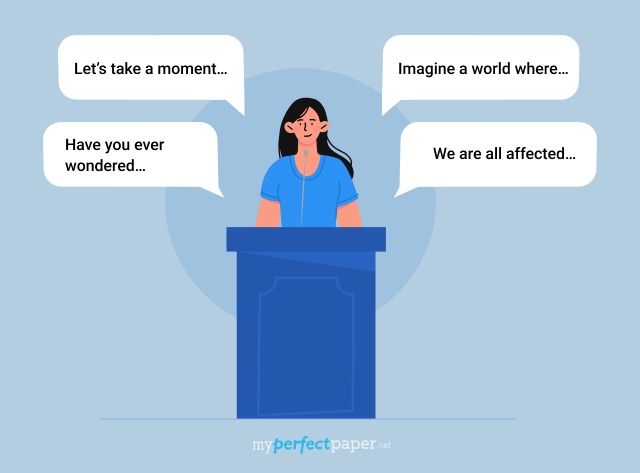7 Effective Ways to Start a Speech
Whether writing a formal address or a casual talk, strong speech writing sets the tone right from the start. There are simple and effective ways to start a speech. Here are some of the best methods.
1. Ask a Thought-Provoking Question
A question makes the audience think and pulls them into the topic. It can challenge their ideas, spark curiosity, or make them reflect on their own experiences.
Example:
"What would you do if you only had 24 hours to achieve your biggest dream?"
2. Use a Powerful Quote
A meaningful statement from a famous person or expert can grab attention and set the stage for what’s coming next. The key is to choose something interesting and relevant, not something people hear all the time.
Example:
"As Nelson Mandela once said, ‘It always seems impossible until it’s done.’ Today, we’re going to talk about overcoming the impossible."
3. Share a Surprising Statistic
Numbers can be powerful, especially if they reveal something unexpected. Instead of just giving facts, frame them in a way that makes the audience pay attention.
Example:
"Did you know that the average person spends six months of their life waiting for red lights to turn green? Time is valuable, and today we’ll talk about how to use it wisely."
4. Tell a Captivating Story
People connect with stories because they create emotion and make ideas feel real. A personal story or an example that relates to the topic can immediately make the audience feel involved.
Example:
"When I was eight years old, I sold my first lemonade for 25 cents. I had no idea that tiny moment would spark my love for business."
5. Make a Bold Statement
Saying something strong and confident at the start makes people curious to hear more. It should be clear, direct, and slightly unexpected.
Example:
"Everything you’ve been told about success is wrong. Let me explain why."
6. Use Humor
A well-placed joke or funny observation can make the audience feel comfortable and engaged. The humor should match the topic and the situation, so it feels natural.
Example:
"Public speaking is the number one fear in the world. That means some of you would rather be in the audience at a funeral than giving the eulogy!"
7. Engage the Audience Directly
Asking them to participate in a quick activity, answer a question, or raise their hands can make them feel involved right from the start.
Example:
"Raise your hand if you’ve ever put something important off until the last minute. Good—now keep them up, because this speech is about procrastination!"
How to Start Different Types of Speeches
Not all speeches are the same, and neither are their openings. A school speech needs a different start than a competition speech. The way a speech begins should match the purpose, audience, and setting.
Here are different ways to start various types of speeches with examples.
How to Start a Speech in School
A school speech should grab students’ attention while keeping things simple and relatable. A personal story or question can work well.
Example:
"Have you ever wished school started later? Studies show that extra sleep can improve learning. But is that possible?"
How to Start a Speech on Stage
A stage speech needs a strong opening to grab attention instantly. A bold statement or an interesting fact can make people pay attention.
Example:
"Every great speaker starts with one thing—confidence. But how do you build confidence when standing in front of a crowd?"
How to Start a Speech for Students
A speech for students should be engaging and relatable. Using humor or a shared experience can create a connection.
Example:
"Raise your hand if you’ve ever panicked before an exam. We’ve all been there, but today, let’s talk about a better way to prepare."
How to Start a Speech for a Competition
A competition speech should be strong from the start. A powerful quote, question, or fact can make an impression.
Example:
"Winston Churchill once said, ‘Success is not final, failure is not fatal: it is the courage to continue that counts.’ Today, let’s talk about what true success means."
How to Start a Speech for Special Occasions
Special occasions call for speeches that fit the moment. Whether it’s a graduation, wedding, or farewell, the right opening sets the tone and captures emotions.
Here’s how to start special occasion speeches with examples:
How to Start a Graduation Speech
A graduation speech should be inspiring and hopeful. Starting with a memorable moment or quote can set the tone.
Example:
"Four years ago, we walked into this school as strangers. Today, we leave as a family. But what truly defines our journey?"
How to Start a Debate Speech
A debate speech should be strong and direct. A bold statement or question can immediately engage the audience.
Example:
"If social media is so ‘connecting,’ why are people lonelier than ever? Let’s break down the truth about technology and relationships."
How to Start a Farewell Speech
A farewell speech should be heartfelt and reflective. A personal memory can make it more meaningful.
Example:
"It’s hard to believe this is our last day together. I still remember my first day here, feeling nervous but excited."
How to Start a Wedding Speech
A wedding speech should be warm and joyful. A heartfelt story about the couple works well.
Example:
"Love stories often start with ‘Once upon a time.’ But for [Bride] and [Groom], their story is just beginning."
How to Start a Best Man Speech
A best man speech should be fun and lighthearted. A funny story or joke about the groom can make people laugh.
Example:
"I’ve known [Groom] for years, and I can confidently say—no one expected him to get married first!"
How to Start a Maid of Honor Speech
A maid of honor speech should be touching and personal. A short story about the bride makes a great opening.
Example:
"I met [Bride] when we were kids, and from that moment, I knew she was special. But today, she’s found someone who sees how special she truly is."
How to Start a Funeral Speech
A funeral speech should be respectful and comforting. A short memory or kind words about the person can be a good start.
Example:
"We are gathered here today not just to mourn, but to celebrate the life of [Name], a person who touched so many hearts."
How to Start a Perfect Speech
A perfect speech depends on the occasion, but a strong start is always clear, engaging, and relevant.
Example:
"Every great speech starts with one thing—a connection with the audience. Let’s begin by asking, what truly matters today?"
How to Start a Speech About a Person
A speech about a person should highlight their qualities or achievements. A strong opening can be a quote, a story, or a personal reflection.
Example:
"Some people leave a mark on the world, and [Person’s Name] is one of them. Let’s take a moment to appreciate their journey and impact."
How to Make the Opening Stronger
A good opening grabs attention, but a strong opening keeps it. Even if a speech starts well, it needs power and clarity to make a lasting impact. Small changes can turn a basic opening into something unforgettable.
Here are simple ways to make the start of a speech stronger and more engaging.
- Keep it short and clear. The first few sentences should be simple and direct. Avoid long introductions.
- Use strong words. Confident and powerful words make a speech sound more interesting.
- Pause after the first line. A short pause lets the audience absorb the message and builds anticipation.
- Make it personal. A personal touch makes the speech feel real and relatable.
- Speak with confidence. A strong voice and good posture show authority and make people listen.
- Match the tone to the topic. A serious speech needs a serious opening, while a fun speech can start with humor.
Examples of Some Famous Great Speech Openings
History is filled with great speeches that started in powerful ways. Some openings were bold, some were emotional, and others asked important questions. These openings show how the right words at the start can make a speech unforgettable.
Here are some famous speech openings that grabbed attention from the first sentence.
- Martin Luther King Jr.: "I Have a Dream" (1963)
"I am happy to join with you today in what will go down in history as the greatest demonstration for freedom in the history of our nation."
- John F. Kennedy: Inaugural Address (1961)
"Ask not what your country can do for you—ask what you can do for your country."
- Barack Obama: Victory Speech (2008)
"If there is anyone out there who still doubts that America is a place where all things are possible, who still wonders if the dream of our founders is alive in our time, who still questions the power of our democracy, tonight is your answer."
- Nelson Mandela: Inaugural Speech (1994)
"Our deepest fear is not that we are inadequate. Our deepest fear is that we are powerful beyond measure."
- Franklin D. Roosevelt: First Inaugural Address (1933)
"The only thing we have to fear is fear itself—nameless, unreasoning, unjustified terror which paralyzes needed efforts to convert retreat into advance."
- Steve Jobs: Stanford Commencement Speech (2005)
"Today, I want to tell you three stories from my life. That’s it. No big deal. Just three stories.”
These speeches show that a strong start can inspire people, grab attention, and make a message unforgettable.
Why is it Important to start a Speech Strongly?
The first words of a speech matter. They don’t just introduce the topic—they set the mood. A strong opening does a few important things:
- Grabs attention. People decide within seconds whether they want to listen.
- Sets the tone. A speech can be exciting, serious, or forgettable, depending on how it starts.
- Builds credibility. A strong opening makes the speaker sound prepared and confident.
Many speakers make mistakes in the beginning.
- Using clichés. Phrases like “Today, I am here to talk about…” are overused and boring.
- Starting too slowly. If the introduction drags, the audience loses interest before the speech even begins.
- Failing to connect. A speech should feel relevant to the audience, not just a series of facts or ideas.
Knowing the right ways to start a speech can make a big difference.
Concluding Thoughts!
A strong opening makes a speech more powerful and keeps the audience engaged. Practicing different techniques helps speakers find a style that works best for them.
Use these techniques, avoid common mistakes, and create a speech that people won’t just hear, but remember.
However, if writing a speech feels challenging, MyPerfectPaper.net is here to help.
Our paper writing service also covers speech writing, ensuring clear, impactful, and well-structured content. Plus, whether it’s a speech, an essay, or any other writing task, we offer expert support, original work, and on-time delivery.
With our speech writing service, students can get a polished, engaging speech that leaves a lasting impression.
Reach out today and make every word count!
















